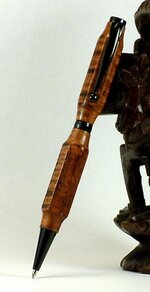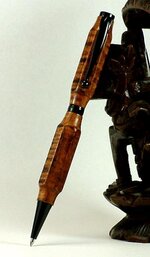Yes, artme is quite correct, Blackwood and Black Wattle are different species, both from the Acacia family, 2 of well over 1,000.
I don't have much experience with the Blackwood, but ain't much I haven't done with the Black Wattle in particular, one of the 5 species that this area is extremely rich of, Black Wattle, Silver Wattle, Golden Wattle, White Acacia and Orange Acacia, very much in this order of availability. Acacias are generally tree/shrubs with a short life expectancy (10 to 20 years), mostly are killed by some little wood borers that live out of these timbers, then the second biggest killer in the fungi that develops on these species.
Silver wattle may be the worse of the lot, with white fungi/bacteria growing in between the outer and the inner skin, these fungi is also responsible for the "transformation" in the wood cells and structure, normally known as spalting. There are unlimited colours and figure formation within Acacia timbers after the spalting process as began, this indeed starts well before the tree/shrub dies, accelerating dramatically when wood become in contact with the soil, very much like a sponge, absorbing all the moisture the soil can produce, one of the fundamental requirements for the spalting formation and development!
Now, I always ask people not to judge a whole timber species, from a single piece as small as a pen blank, I don't believe those supplying timber to others, like myself, will ever deliberately select a unusable/bad piece, for the
"purpose that piece was ordered for", an unusable/bad piece to same can be the ideal piece to others, mainly when casting and stabilizing have become and option for so many...!
With this said, and taking in consideration that I was not obviously, the person to supplied that wood to you, does not change the truth and reality of what I just said (above). I always also recommend and suggest that people just starting turning or with little experience, to avoid buying or using timbers that require a special treatment (hardening, knots, voids, flaws, filling, etc), these type blanks should be kept for latter, when a little experience is behind you. There are literally thousands of timbers capable of producing "clean" and "easy" blanks, a lot more suitable for practice and learning.
On the other hand, I have had new turners that want to start with the difficult stuff, and be challenged with their improvisation capabilities, there is no such thing as a rule to what one should or not, start with or use, that is very much a personal choice so, don't despair mate, there are a lot of others out there with lots of experience, that blow apart blanks that should have not been blown, some of them of some rarity and expense, after all, is only a pen blank...!:wink:
Send me your address (PM), and I will send you a few of my Acacia blanks, free of charge!:biggrin:
Merry Christmas!

Cheers
George


